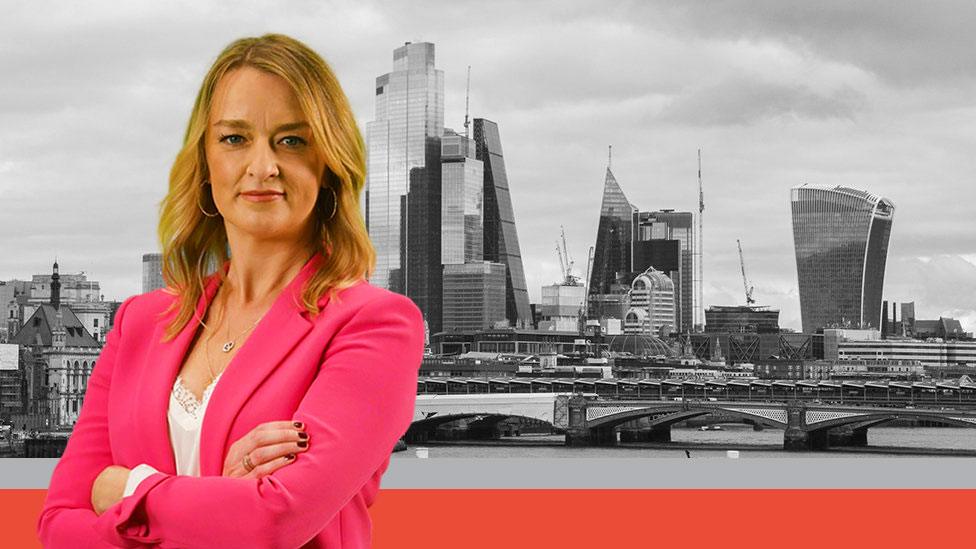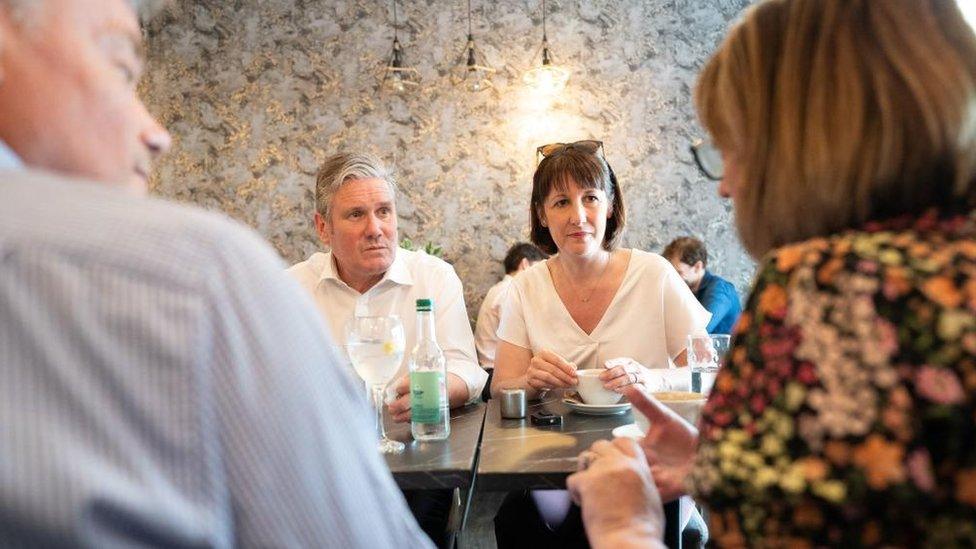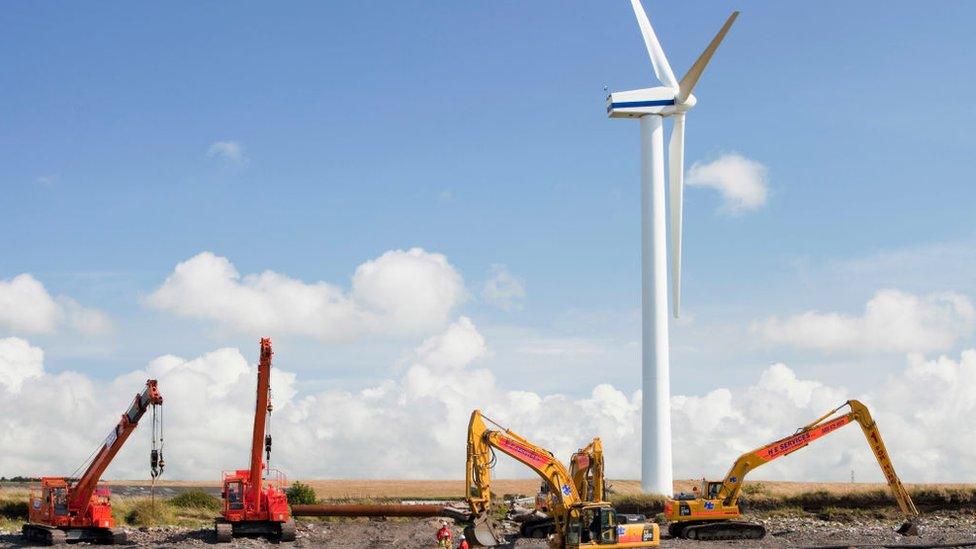Laura Kuenssberg: Why you should not expect a cheque book election
- Published

"It's the economy, stupid."
It's a well-worn trope that the politicians who look after our wallets are the ones who tend to win.
With interest rates still climbing, inflation still gobbling up spending power and taxes at historically high levels, times are hard for millions.
A winning political party certainly needs smart answers. Labour has been miles ahead in the polls for many months, but can the party, and its shadow chancellor Rachel Reeves - who is on our show this Sunday - persuade you their answers add up?
Labour are not short of slogans about the state of the economy. You only need to glance at their MPs' social media, or dip into the House of Commons for a few minutes, to hear one of the economic charges they are levelling against the Conservatives.
But when you look closely at the party's actual plans, it is not so easy to spot the difference.
Taxes are already very high and Labour has no desire to raise them beyond a couple of specific, and relatively minor changes, like charging VAT on private school fees and altering non-dom status (where a UK resident whose permanent home is outside the country pays British taxes on money earned here but not on income from overseas).
What about spending on public services? With the election probably still more than a year away Labour doesn't want to be drawn - although you'll hear some shadow ministers make warm noises about spending "more".
And there's not an obvious difference when it comes to spending on benefits either. Both main parties want to keep the very expensive protection for pensioners - the so-called "triple lock".
To the irritation of many Labour left-wingers they have not committed to getting rid of the two-child limit, external, where parents who have a third or subsequent child do not qualify for additional financial support. So on the traditional areas of tax, spending and benefits, playing spot the difference between the government and the wannabe government doesn't get you that far.
There are important distinctions we'll come to in a second, but it is worth pondering the mixture of politics and policies that seems to make the gap quite narrow.

First, Labour know the Conservatives will grab any shred of evidence to suggest their opponents will splash the cash irresponsibly.
Ms Reeves has long been trying to counter that with the strict message that all spending has to be paid for. Her so-called "fiscal rules" mean a hypothetical Labour government would only borrow to invest.
That is frustrating to some in Labour, with one MP on the party's left telling me: "I know the front bench is concerned about appearing credible, and the conclusion is to spend less money, but because things are so bad we have to be much bolder."
Another MP said the "self-imposed strait-jacket is going to be more and more of a problem".
There is zero chance that Ms Reeves and Sir Keir Starmer are going to budge on this.
That's not just because they don't want to give the Tories an inch, but because they have what a source described as a genuinely "hard-headed" even "zealot-like" approach to controlling spending. This is not just a political decision, it's based on principles too.
With the economy in a bad way, a safety-first attitude prevails - especially after the pandemonium of the Truss government last autumn.
As one Labour-backing City insider says: "The whole approach right now is to ensure investors are confident in the UK."
Another source suggested "people in the City are quite worried that this government and the regulators have already moved a long way to the interventionist side of things - Rachel will have heard that in spades".

As well as Labour's shadow chancellor Rachel Reeves, we'll hear from Financial Secretary to the Treasury Victoria Atkins
Also on the show are actors James Norton and Luke Thompson talking about their play A Little Life
Watch from 09:00 BST this Sunday on BBC One and iPlayer or follow the latest here on the BBC News website

Labour also knows not to reveal its hand this far from an election. That's partly because the financial pressures people face will change by the time the UK goes to the polls. And there is always a risk of your rivals nabbing your plans.
There are differences though - most notably Labour's promise to spend up to £28bn a year on shifting to a greener economy. The party would create a National Wealth Fund to invest in big projects and create a state-owned green power firm called GB Energy.
While Ms Reeves may not have an intensely detailed programme, she does have a new brand: "Securonomics".
"Securonomics" is meant to be a whole new way of doing business. Making and selling more in the UK, creating more lasting jobs, and working more closely with industry to make sure the country is competing with its rivals.
It is meant to sound radical, but what it means in practice is unclear. As one source put it: "Securonomics is extremely clever because it feels like there is a lot in there but it is not very obvious what is."
There is an opportunity for Labour here. Even without the finer details, there is clear difference over how much the main parties would be prepared to intervene in the economy.

Labour has watered down its pledge to invest in more green energy
Labour is also likely to make a big thing in the run up to the next election of expanding workers' rights. While what will actually end up in the manifesto is yet to be finalised, one shadow minister says you can expect it to be a "big part of the offer" across the UK.
So while Labour's Treasury team shares some of the Conservatives' view that now is not the time to go wild with public spending or borrowing, there are important distinctions.
But that shared instinct to be careful with the cash is getting stronger because of what is happening to interest rates.
One economist notes that if short and medium-term interest rates are one percentage point higher than expected it raises borrowing by £20bn in the medium term.
So it is getting more expensive for the government to borrow - as is the cost of repaying the debts the country already has.
Of course there are always economic choices about taking an alternative approach. But the desire to keep debt down is something Labour's leadership and the Conservatives share.
Ms Reeves has scaled back her green ambitions just as Chancellor Jeremy Hunt has talked down the prospect of tax cuts.
Voters on the left may be frustrated that Labour is promising less than in recent years, but it is harder to make big promises when there is less to go around - so we shouldn't expect a cheque book election.
